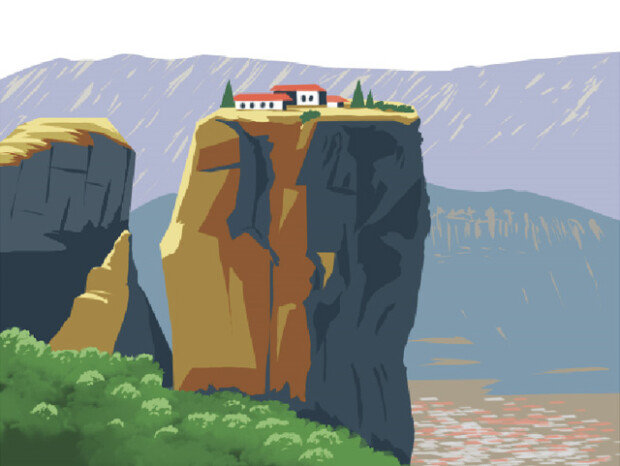The war on the sacred land
The war on the sacred land
Posted October. 15, 2019 07:31,
Updated October. 15, 2019 07:31

Where do you think is the holiest place in Greece from a religious viewpoint? In ancient Greek times, it may be Delphi in which the Temple of Apollo stands. In modern history, Meteora is considered the most sacred site with monasteries of Eastern Orthodoxy spotted around. Etymologically, the name of the rock formation signifies “rock in the middle of the sky" and "suspended in the air.” Five hours away from Athens, Meteora in northern Thessaly is famous for a picturesque monastery that sits on vertically standing rock beds and oddly formed stones. Getting mesmerized by its beauty, some even say that only Meteora can replace itself on Earth.
Here is one thing that many visitors may not know about Meteora: It was a bloody battle ground during the First and Second World Wars. Currently, there stand six monasteries, the largest among which is the Holy Monastery of Great Meteoron. Leaving unnoticed, pictures in the corridor describe the tragic and grim scenes of Greece, a small power state, fighting against Germany and Italy to safeguard its sovereignty.
With a deep understanding of the geographical features of Meteora, the Greek forces built up its military base camp on top of the mountains and drew cannon compartments up high with them tied with ropes. Greek people, young and old, climbed up the vertically stiff cliff with cartridge boxes and war supplies on their back. Men rained bullets on the enemy while women threw stones down the cliff. The description shows how desperate people of a small state were to protect their country although it overly induces emotions and patriotism. In some sense, you may find yourself sad and surprised by the fact that the scared site used to be a bloody battlefield. However, it is only natural that it takes your blood and sweat to uphold values that are precious and even sacred. In fact, Acropolis with the Parthenon Temple, known as the centerpiece of ancient Athens politics as well as the symbol of Greek culture, was first built up as a military fortress. Regrettably, this fundamental truth is often left unattended and even intentionally denied in Korean society.
yes@donga.com
Headline News
- N. Korea launches cyberattacks on S. Korea's defense companies
- Major university hospital professors consider a day off each week
- Italy suffers from fiscal deficits from ‘Super Bonus’ scheme
- Inter Milan secures 20th Serie A title, surpassing AC Milan
- Ruling and opposition prioritize spending amid tax revenue shortfalls







